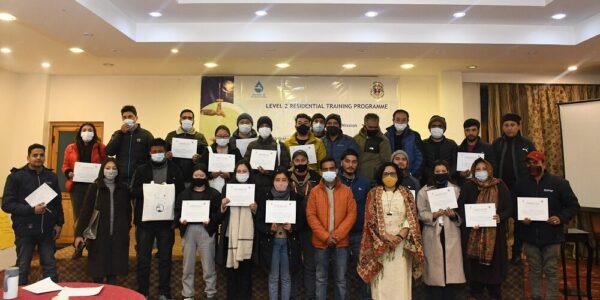Training programme under JJM for Ladakh officials takes place
Leh, February 23: A two-day (level 2) training programme was organized by the All India Institute of Local Self-Government (AIILSG) for UT Ladakh officials, under the National Jal Jeevan Mission.
The objective of the training was to understand the reason behind incorporating a participatory approach in the planning, implementation, operation, and maintenance of the Rural Drinking Water Supply (RDWS) project; to learn how to apply and implement the various methods and tools to incorporate a participatory approach at the various stages of RDWS projects; equip the officials with frameworks and tools that they can use to monitor the performance of participatory planning, and implementation and operation and maintenance of RDWS projects.
During the training, the participants took part in group activities, brainstormed, and exchanged ideas to seek solutions for the challenges they faced and the role of the community in making Jal Jeevan Mission a success.
* Click to Follow Voice of Ladakh on WhatsApp *
“We talked about where exactly the Ladakhi engineers need the participation of the community. We understood the technical solutions that the engineers have, it is a low-cost solution for dealing with freezing pipes in winter. Their solution works provided the community at a property level, cooperates in doing their action. If the community doesn’t do their action, it is a risk to the network. As this is the lowest cost option” said resource person and AIILSG official, Dr. Bhakti Devi.
As part of the training, the participants discussed various technical solutions depending on the source of the water. They said if the source of water is a surface water stream, then the solution is to do ‘bleeding’. The bleeding process involves that water is used conservatively and it also requires the community to keep their tap open and running during the winter months because this prevents the tap water from freezing. Other alternative solutions where the community can put localized insulation were explored. The roles and responsibilities of the village water sanitation committee and their partnership in making the Jal Jeevan mission successful were also discussed in detail.
“This training was very beneficial. A lot of times we face challenges due to a lack of public awareness, it’s helpful to educate the public” said one of the participants, Junior engineer, PHE Department, Nikhat.
Another participant said that the training was important and beneficial because the resource persons shared their experiences and guided the participants. He said that he felt inspired to adopt the solutions discussed and use them in the villages.
Dr. Bhakti Devi said that the Jal Jeevan Mission was a unique and very well-resourced programme. She added that because Jal Jeevan Mission has done such good planning, designing, resourcing, budgeting for training, and budgeting for digital monitoring, the onus is on the local people on how well they can deliver.
“There is a very good chance of Ladakh very successfully delivering and becoming a role model example. They have completed village action plans, have completed Detailed Project Reports, and are already tendered. I think it’s a very good opportunity and I feel Ladakh is well on its way.” said Dr. Bhakti Devi.
The two-day training programme took place from February 21, 2022, to February 22, 2022. As part of the training, the participants also went on a field visit to Phey village.

0 Comments